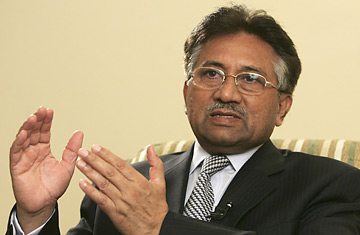
Pakistani President Pervez Musharraf
As U.S. Deputy Secretary of State John Negroponte arrived in Pakistan to press President General Pervez Musharraf to lift emergency rule and step down as army chief, opposition parties, led by former Prime Minister Benazir Bhutto, have renewed calls for the general's ouster. This two-pronged attack on Musharraf's political plans came on the same day that he presided over the swearing-in of a caretaker government to run the country until parliamentary elections slated for early January. Pakistan's parliament dissolved at midnight on Thursday, completing its full five-year term for the first time in the country's history. And Musharraf, the general-turned-President who overthrew Prime Minister Nawaz Sharif in 1999, claimed credit for restoring democracy in Pakistan. "I take pride in the fact that, being a man in uniform, I have actually introduced the essence of democracy in Pakistan," he said at the ceremony. "Whether anyone believes it or not."
Musharraf may have a hard time finding any believers. Since he invoked emergency rule two weeks ago, he has suspended the constitution, jailed opposition leaders, muzzled the media and replaced the independent judiciary with a Supreme Court bench of his own choosing. Even Negroponte, who has previously called Musharraf "indispensable," said on Thursday that Pakistan's political process had been derailed and that he was coming to help put it back on track.
The U.S. diplomat faces a Herculean task. There is little Washington can do at this point, if the Bush Administration wants to let its most important ally in the war on terror stay on the scene. Musharraf has said he will step down as Army chief in the coming weeks, once the new Supreme Court overrules challenges to his recent reelection as president. He has also started releasing detained human rights campaigners and opposition leaders such as Bhutto. Two of the banned television stations have been allowed back on air. And Musharraf has set dates for elections, another key U.S. demand — although he has also transferred the power to enforce or lift emergency rule to the presidency, which means that even as a civilian President he retains extra-constitutional control over the country — and the upcoming elections.
Musharraf maintains that emergency rule is essential for ensuring peaceful, democratic elections, and for combating extremist militancy. And, perhaps mindful of criticism that Musharraf's emergency rule has distracted security forces from the war against Islamist extremists, the military mounted an offensive this week to reverse recent gains made by Taliban-aligned militants in the Swat Valley. Critics, however, warn that by banning rallies, muzzling the press and keeping the threat of detention hanging over every political organizer, the emergency prevents the staging of a credible election campaign.
"There can be no fair and free elections under the emergency; there can be no fair and free elections when the chief of army staff is also President; there can be no fair and free election under the present Election Commission," Bhutto told reporters after being freed from house arrest on Thursday. She and other opposition leaders are considering boycotting the election altogether.
To many Pakistanis, however, elections with or without emergency rule won't make much of a difference. "The army was ruling before the emergency, and still it is ruling," says toy salesman Yair Khan. "Pakistan is in a continuous state of emergency." Many in the bazaars of Islamabad's slum areas share his indifference. While politics in Pakistan are often waged in the name of the poor, few in the lower classes feel that they have anything to gain. "The main rule of thumb in Pakistani politics is that everyone safeguards their own interest first. No one really cares about the people," says Enyat Hussain, a fresh-juice vendor at Islamabad's Melody food market. At nearby Abpara Market, newspaper vendor Amjad Iqbal watched as anti-emergency-law protesters shouted slogans and waved flags at a major intersection. When asked why he didn't join in, he just shrugged. "It makes no difference anyway. Nobody listens." In front of his stand, five men crowded around a newspaper. The emergency is good for one thing at least, said Iqbal. "Newspaper sales have doubled."
